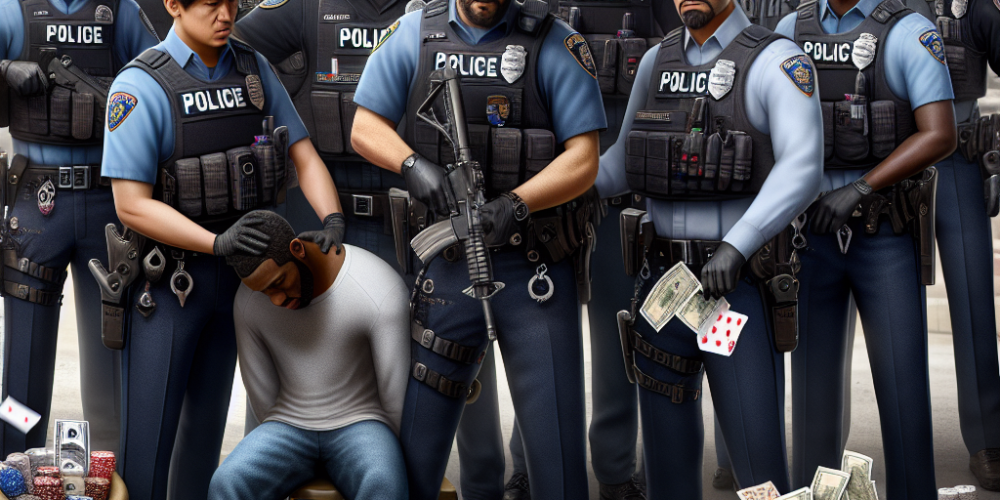In August 2025, Houston police successfully dismantled a robbery gang responsible for targeting more than 20 poker players over a period of several months. The gang’s modus operandi involved trailing victims from venues such as Lucky J’s Social Club and launching attacks as the players left the premises. The investigation gained momentum following a brazen attack on a 70-year-old man, whose encounter with the gang led to a significant breakthrough for law enforcement.
The elderly victim was accosted by the gang outside his home, where they attempted to steal his wallet. However, in their hurried attempt to escape, the suspects crashed their getaway car and were forced to flee on foot, leaving a trail of evidence that police swiftly exploited. The apprehension of the four suspects marks a significant victory in efforts to curb rising crime rates affecting poker enthusiasts in the region.
The suspects were promptly arrested and identified, with court proceedings slated for October. Authorities have hinted at the possibility of additional arrests, as the investigation reveals more individuals potentially linked to the criminal activities.
The crackdown brings to light the complexities surrounding the legality of poker clubs in Texas. These establishments operate within a legal gray area, as long as they function as private recreational spaces without a house rake. In this setup, the club owners do not profit directly from the games, which remains a critical distinction under state law.
This regulatory loophole has allowed such clubs to flourish, providing poker aficionados a venue to indulge in their pastime. Law enforcement’s focus has remained squarely on the perpetrators of robberies rather than the venues where poker games are hosted. This selective approach underscores the challenges police face in maintaining order without overstepping legal boundaries.
The poker community has been on edge following these incidents. Regular attendees frequent these clubs for their social and competitive appeal, not expecting to be targeted once they leave a session. Despite the unsettling events, some club regulars express confidence in their continued patronage, drawing comfort from heightened police presence and community vigilance. As one player mused, the thrill of poker comes from the game itself, not the potential dangers lurking outside.
That said, not everyone shares this optimism. Concerns over personal safety have grown, with some players reconsidering their participation in these clubs. The fear of being watched or followed has understandably placed a damper on the otherwise vibrant poker scene. Critics argue that unless security measures are significantly improved, these clubs could see a decline in attendance.
The broader economic context cannot be ignored. Houston, like many urban centers, has seen fluctuations in crime rates influenced by economic conditions. Rising costs of living and disparities in income have often been linked to increased criminal activities. The poker club robberies, therefore, could be seen as symptomatic of larger socioeconomic challenges facing the city.
However, the arrest of the gang provides hope that a focused and strategic law enforcement approach can yield positive results. The police’s success in this case rests not only on their investigative prowess but also on community cooperation, emphasizing the importance of public involvement in tackling crime.
Moreover, this incident has prompted discussions about the need for stringent regulations and better security protocols at poker clubs. Some propose that clubs invest in surveillance technologies and collaborate more closely with local law enforcement to preemptively address threats. Others suggest that a clearer regulatory framework could help eliminate loopholes that might be exploited by criminal elements.
A counterpoint to the prevailing concerns is that incidents like these, while alarming, are relatively isolated. Many argue that the majority of poker venues operate peacefully, with disputes rarely escalating into criminal acts. This perspective suggests that while vigilance is necessary, panic and overreaction could be detrimental to the social fabric these clubs offer.
As the poker community awaits further developments, the case serves as a reminder of the delicate balance between recreation and security. The outcome of the upcoming court proceedings in October will likely set precedents for how similar cases are handled in the future, potentially influencing policy changes within the industry. The resolution of this case could also shape public perception of poker clubs and their role within the broader community.
In conclusion, the dismantling of the robbery gang represents both a triumph for law enforcement and a moment of reckoning for poker enthusiasts. As Houston grapples with the implications, one thing remains clear: the passion for poker persists, even as measures are taken to ensure that it is safely pursued.

David Harrison stands tall in gambling journalism, marrying his firsthand casino experiences with a deep understanding of betting psychology. His articles transform complex gambling jargon into engaging tales of strategy and chance, making the world of betting accessible and enjoyable. David’s knack for narrative extends beyond print, making him a sought-after speaker on gambling trends and future bets. In the realm of gambling, David is both a scholar and a storyteller, captivating readers and listeners alike.
















